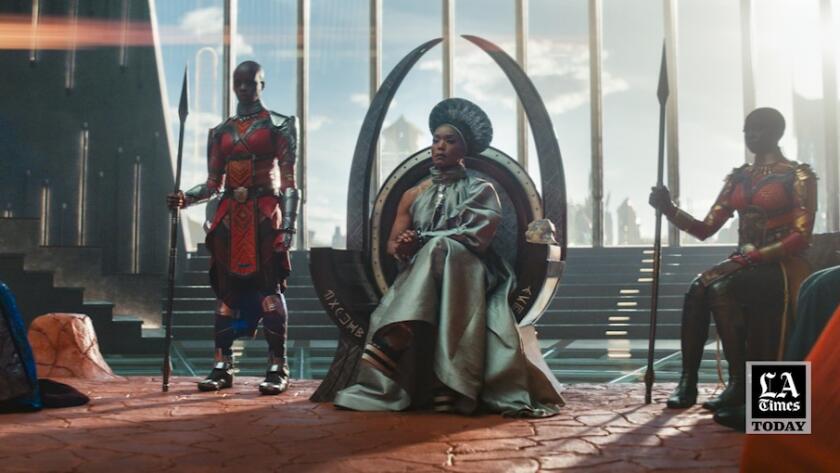In the shadow of grief, ‘Wakanda Forever’ forges messily but valiantly ahead
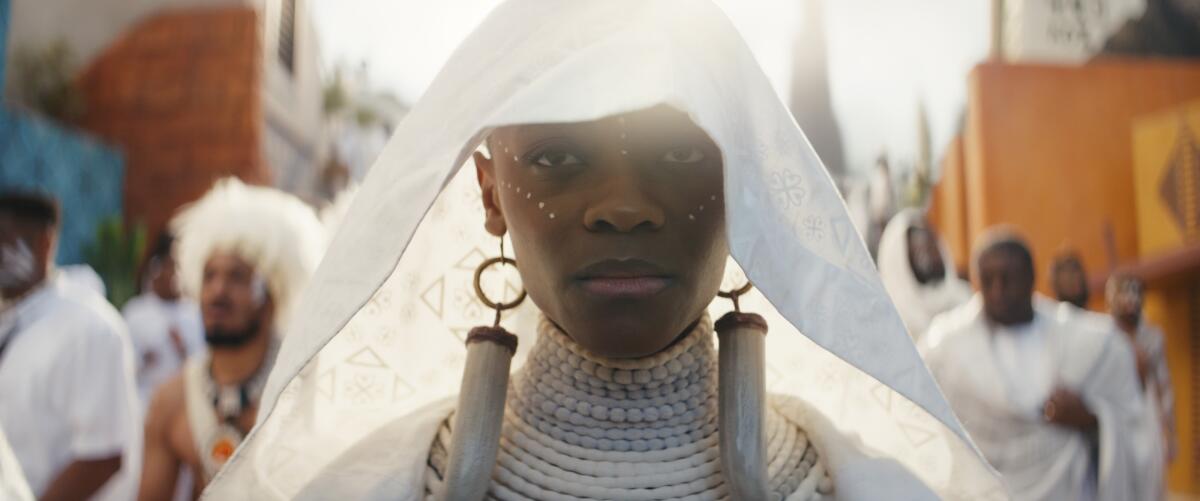
- Share via
The end comes right at the beginning: swift, expected, crushing. King T’Challa, the Black Panther of Wakanda, is grievously ill, and his brilliant scientist sister, Shuri (a forceful Letitia Wright), is working desperately to engineer a cure. The clock ticks and the camera races, but for all the tension there’s predictably zero suspense: T’Challa is soon dead, leaving the princess and the queen mother, Ramonda (Angela Bassett), to grieve with their subjects. That we never see even a flashback to T’Challa’s face — the face of the late Chadwick Boseman — in these opening moments adds to the sense of finality, of an absence that reverberates beyond the parameters of fiction. We share the characters’ devastation but not their shock; unlike them, we’ve had some time to prepare.
So, of course, have the filmmakers. And from the opening scenes of “Black Panther: Wakanda Forever,” director Ryan Coogler’s tact, intelligence and discernment are more than apparent. He wants to honor — without exploiting — Boseman’s memory, and he knows that he doesn’t have to push hard to earn our tears. He also knows that, as a matter of narrative opportunity as well as philosophical principle, every end really is a beginning. And so even as he guides us on a hushed procession through the streets of Wakanda and through a series of eerily beautiful funeral rites, Coogler maintains unflagging forward momentum and quickly puts a grief-stricken empire on high alert. There are already new adventures — and yes, fresh occasions for grief — on the horizon.
For your safety
The Times is committed to reviewing theatrical film releases during the COVID-19 pandemic. Because moviegoing carries risks during this time, we remind readers to follow health and safety guidelines as outlined by the CDC and local health officials.
The story Coogler tells is unwieldy and strange, sometimes thrilling yet inescapably somber. As diplomacy fails, secrets change hands and forces clash on land and at sea, you never quite forget that you’re witnessing not just a busy narrative juggling act but also an imperfect solution to an impossible problem. Not long after Boseman’s death in 2020, speculation ran rampant as to how the much-anticipated sequel to 2018’s “Black Panther,” one of the most commercially and culturally significant blockbusters of all time, would shoulder such a blow. Would T’Challa be recast? Would some ghoulish digitally confected version of Boseman’s character live to fight another day? Those options were rejected, and “Black Panther: Wakanda Forever” is now something entirely different from what its makers must have once envisioned: an entertainment and an elegy, a blurring of tragedies on- and off-screen, a story both misshapen and ennobled by once-unthinkable loss.
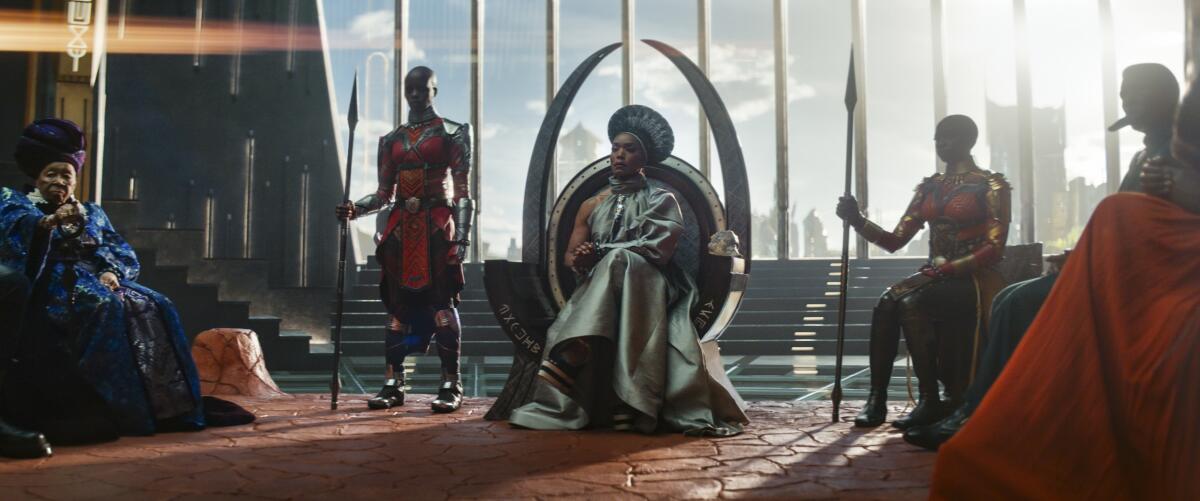
And why not? The power of Coogler’s first “Black Panther” movie — what made it such a singular oasis of emotion, meaning and political imagination in the Marvel Cinematic Universe — lay precisely in its real-world friction, its refusal to shy away from grief and pain. Here was a comic-book fantasy both despairing and utopian, rooted in an extravagant superhero mythology (first concocted in the ’60s by Stan Lee and Jack Kirby) that served to deepen, rather than depart from, the audience’s consciousness. Technologically advanced and vibranium-fortified, the kingdom of Wakanda emerged fully formed as what the New Yorker’s Jelani Cobb called “a redemptive counter-mythology” — a powerfully imagined corrective to the white colonization of the African continent, if also a kingdom situated at a strategic remove from the ongoing struggle for Black liberation worldwide.
“Black Panther” ended with Wakanda agreeing to lower its isolationist shield and join the international community. As the new movie opens, the kingdom is witnessing the costs of that concession, thanks to the global hunger for vibranium, the all-powerful metal that fuels Wakanda’s techno-supremacy. There’s something unmistakably resonant about the idea of a nation that has never known the threat of colonization or conquest suddenly finding itself beset on all sides, its position even more compromised by the untimely loss of its most cherished son. More resonant still is the image of Ramonda, played by Bassett with sublimated anguish and stunning fury, bearing the full weight of her moral authority as she steps fearlessly into the breach.
Ramonda’s presence on the Wakandan throne, with Shuri serving as her closest consort, builds on a feminist foundation that was already well laid in the earlier movie. For all its paternalistic Sturm und Drang (including Michael B. Jordan’s galvanizing villainy as Erik Killmonger), the first “Black Panther” reveled in the power of its women warriors and leaders, all of whom return here in full force and in some cases with key reinforcements. There’s a nifty early display of spear-whirling by the Dora Milaje, once again led by the loyal Okoye (the formidable Danai Gurira) and bolstered by a striking new soldier, Aneka (“I May Destroy You’s” Michaela Coel). Also leaping into the mix is Riri (Dominique Thorne), a 19-year-old tech prodigy who soars and tumbles like Icarus and wisecracks like someone clearly being primed for future Marvel outings.
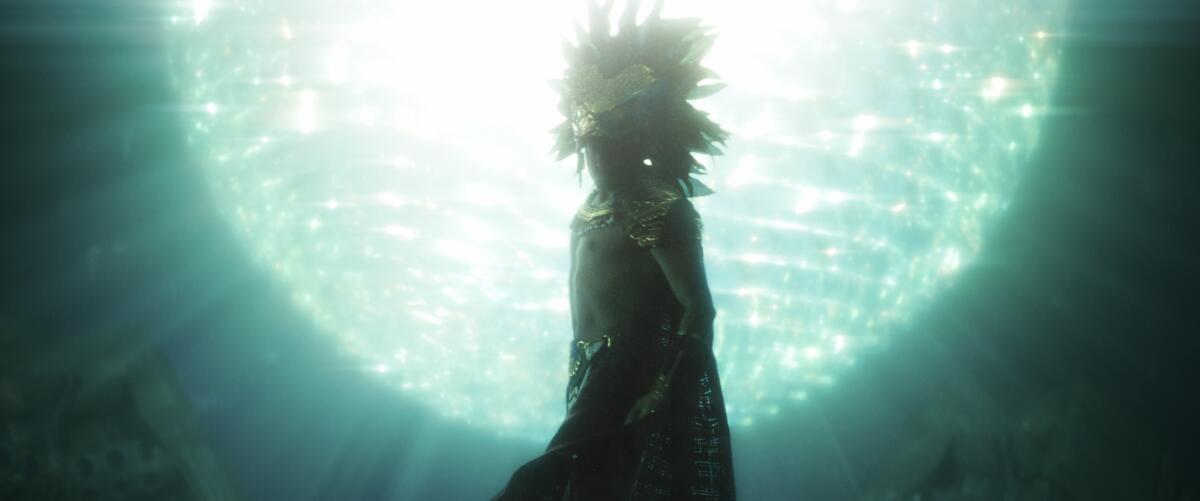
While Riri’s whip-smart energy gives the proceedings a welcome early jolt, the character feels increasingly like an afterthought, especially once Coogler and his co-writer, Joe Robert Cole, usher in a few paradigm-rattling twists. Enter Namor (the charismatic Tenoch Huerta), the ruler of an Atlantis-like undersea kingdom called Talokan that, like Wakanda, runs on vibranium and was until recently a very well-kept secret. A seductive bronze-chested demigod, Namor has pointy elfin ears and winged feet reminiscent of the Greek god Hermes, but this lesser-known forerunner of DC Comics’ Aquaman is actually descended — quite literally descended, given his watery home — from an ancient Maya community. There are traces of that heritage in the hieroglyphics carved into Talokan’s stony grottos, and also in Namor’s feathered headdress and intricate jewelry. (It’s less apparent in his subjects, whose bluish skin and fish-like gills suggest a more rubbery-looking variant of the Na’vi characters in James Cameron’s forthcoming “Avatar: The Way of Water.”)
The clash between the forces of Wakanda and Talokan — a mighty African kingdom and its Mesoamerican counterpart — introduces an intriguing new cultural-mythological dynamic and raises all manner of thorny questions about race and allyship among characters of Black, Indigenous and Latin American descent. (It also opens up new worlds of aesthetic possibility for costume designer Ruth E. Carter, production designer Hannah Beachler and composer Ludwig Göransson, all expanding beautifully on their Oscar-winning contributions to the first “Black Panther.”) Less interestingly, that clash also drives most of the action, and as with nearly every Marvel blockbuster, the many scenes of choreographed combat are by far the movie’s most workmanlike, absent any real visceral oomph and bogged down, especially at the climax, by too much frenzied cross-cutting.
‘Wakanda Forever’s’ Tenoch Huerta opens up about racism and colorism in Latin America — and the ‘crazy heartfelt’ speech he gave to win over the crew.
It’s telling that both the first “Black Panther” and this messier if seldom less engrossing follow-up are at their strongest when they resist or even flat-out ignore their franchise obligations. (The movie falls flat whenever it cuts away from Wakanda and Talokan to various CIA machinations I won’t reveal, not because of spoilers but because they’re too tedious for words.) At times, a sacrilegious and probably deranged-sounding question rises to the surface: Did “Wakanda Forever” even have to be a superhero movie? It gives away little to note that someone new will wind up inheriting T’Challa’s catsuit, carrying on the Black Panther mantle and, in all likelihood, taking her place in the next phase of the endless MCU soap opera. The baton pass is bracing without feeling particularly satisfying, not least because the anointing of another Wakandan figurehead ultimately feels antithetical to the movie’s democratic spirit.
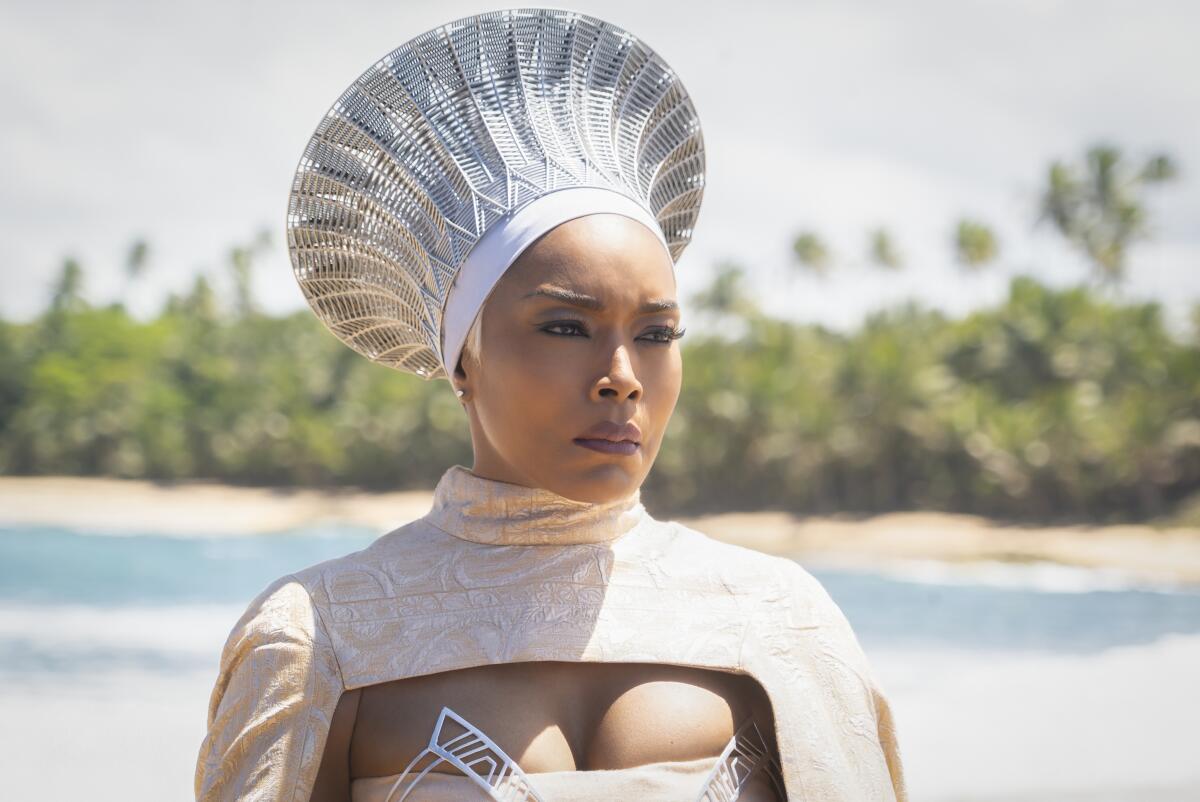
One of the reasons Boseman was such a marvelous actor was his genius for self-effacement, his ability to hold the spotlight without dominating it. His generosity toward his fellow actors was particularly well suited to T’Challa, a character who wasn’t — and didn’t have to be — the most interesting thing about the world he came from. Happily, you see more of that world in “Wakanda Forever.” You see it in the regal ceremonial isicholo that Ramonda wears while meeting with a council of Wakandan elders, played by familiar faces like Isaach de Bankolé and the late Dorothy Steel (who died in 2021). You also see it in Winston Duke’s ever-boisterous M’Baku, that fur-clad bear of a tribal leader, and in Lupita Nyong’o’s superb, underused performance as the skilled spy Nakia, who returns to serve her country after a period in self-exile. She has reservations about the circumstances, but it’s still a welcome homecoming. You’ll know the feeling.
‘Black Panther: Wakanda Forever’
Rating: PG-13, for sequences of strong violence, action and some language
Running time: 2 hours, 41 minutes
Playing: Starts Nov. 11 in general release
- Share via
Watch L.A. Times Today at 7 p.m. on Spectrum News 1 on Channel 1 or live stream on the Spectrum News App. Palos Verdes Peninsula and Orange County viewers can watch on Cox Systems on channel 99.
More to Read
Only good movies
Get the Indie Focus newsletter, Mark Olsen's weekly guide to the world of cinema.
You may occasionally receive promotional content from the Los Angeles Times.

